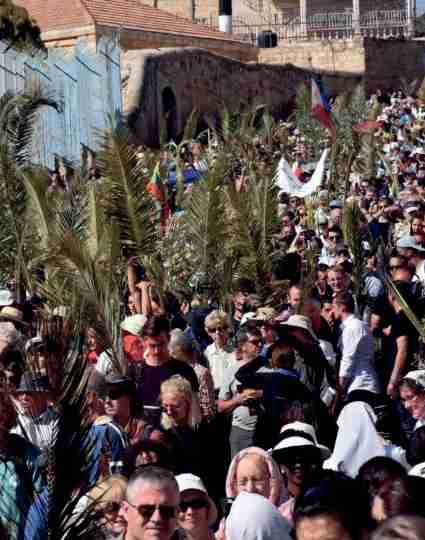JERUSALEM (AP) – A small group of Franciscan monks and Roman Catholic faithful took to the streets of Jerusalem’s Christian Quarter in the Old City Sunday to distribute olive branches, after the traditional Palm Sunday procession was cancelled due to restrictions imposed to contain the spread of the coronavirus.
As the number of COVID-19 cases rose in Israel, the government announced it had arranged a massive airlift of masks, protective suits and medical supplies from China. Elsewhere in the region, Iran, which is dealing with the worst outbreak in the Mideast, announced plans to allow some businesses to reopen later this month even as the death toll continued to climb.
Lebanon reopened its airport to allow citizens stranded overseas to return home, while churches that had remained open for Palm Sunday even during the country’s 1975-1990 civil war were mostly empty.
A top Pakistani official also called on the United Nations and other wealthier countries to send emergency food and medical assistance to hundreds of thousands of Afghan refugees locked down in camps in the border region.
Palm Sunday celebrations start the Holy Week leading up to Easter. Worshippers in Jerusalem traditionally carry palm fronds and olive branches, and march from the top of the Mount of Olives into the Old City.
While thousands of pilgrims usually participate in the march, this year was limited to a handful of participants. Clerics and faithful went door to door often throwing the branches to Christians looking on from their balconies.
SIGN OF HOPE
“This year, because of the new situation, we are trying to come to all the Christians in our Christian Quarter to bring these branches of olives, the sign of new hope,” said the Rev. Sandro Tomasevic, a Catholic clergyman at the Latin Parish of Jerusalem.
The coronavirus causes mild to moderate symptoms in most patients, who recover within a few weeks. But it is highly contagious and can be spread by people showing no symptoms. It can cause serious illness and death in some patients, particularly the elderly and those with underlying health issues.
In Israel, more than 8,000 people have contracted the coronavirus and 48 have died. The Israeli military began an operation in the hard-hit central city of Bnei Brak, helping to distribute food and medicine.
The Israeli Defense Ministry said it had helped arrange two weeks of airlifts for medical equipment from China. The first plane was scheduled to arrive on Monday, carrying over 900,000 surgical masks and half a million protective suits for medical teams.
Separately, Iran’s state TV reported that an additional 151 people had died, pushing the death toll to 3,603 with over 58,000 confirmed cases.
However, President Hassan Rouhani announced that low-risk businesses will be allowed to resume their activities in Tehran on April 18. Businesses in other provinces will begin a week earlier, on April 11, he said during a meeting Saturday.
STUCK IN SAUDI
In Lebanon, a jet brought more than 70 citizens who had been stuck for nearly three weeks in Saudi Arabia after Beirut’s international airport closed. It was the first flight returning thousands of Lebanese from around the world, with three more scheduled to arrive Sunday.
Prime Minister Hassan Diab said up to 21,000 people have registered to return home, and the process will take several weeks. Lebanon has reported 520 cases of coronavirus and 18 deaths since the first case was reported in late February.
Churches were mostly empty for Palm Sunday in the tiny Mediterranean country, which has the largest percentage of Christians in the Middle East. In some villages, priests drove in pickup trucks decorated with palm and olive branches to celebrate Mass out in the open air, as residents either stood nearby or watched for their balconies.
In Pakistan, the frontier regions minister warned of a dire situation facing the 1.5 million Afghans living as refugees, and said the U.N. and other nations must take action. Many refugees are daily wage earners who have been hardest hit by Pakistan’s countrywide lockdown.
“If Pakistan can roll out a special relief package for Afghan refugees, why can’t the developed nations come to the rescue of the besieged refugees?” said the minister, Shehryar Khan Afridi.
In the Gaza Strip, the first group of Palestinians were allowed to leave makeshift quarantine centers at four Gaza schools after a 21-day period of isolation. The Health Ministry said most of the 320 people were returnees from abroad.
Gaza’s Hamas rulers have raced to set up quarantine facilities since March 15 to avoid an outbreak, which would be catastrophic given Gaza’s dense population and decimated health system. Twelve cases have been confirmed, all inside the quarantine centers, according to the ministry.
Gaza has been under Israeli-Egyptian blockade and travel restrictions since 2007.
Associated Press writers Nasser Karimi in Tehran, Iran; Bassem Mroue in Beirut; and Asim Tanvir in Multan, Pakistan contributed to this report.









No Comment